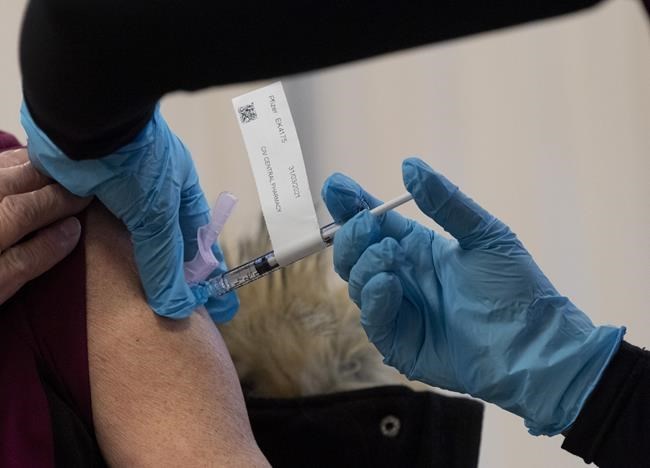OTTAWA — Two vaccine developers in Canada say a lack of federal funding early in the pandemic kept homegrown COVID-19 vaccines from moving as quickly as international versions.
Nearly 1.1 million Canadians have now received a single dose of either the Pfizer-BioNTech or Moderna vaccines.
With deliveries from Pfizer-BioNTech now exceeding 400,000 doses a week, Canadian provinces and territories have vaccinated more than 170,000 people since Friday. On Saturday, Canada had its best day since the vaccination campaign began, with 49,707 people vaccinated.
But comparatively, the United Kingdom is vaccinating more than 400,000 people a day, and the United States last week averaged more than 1.7 million daily injections. Germany vaccinated about 140,000 people on Sunday.
All three of those countries invested heavily in domestic vaccine development. The ability to make the vaccines at home has helped them get vaccines delivered much faster.
John Lewis, the CEO of Entos Pharmaceuticals in Alberta, said Canada's investments were much more timid.
"I think it's extremely clear that if you look at the success around the globe, decisive and upfront funding of multiple vaccine candidates all the way through to the end was key to both their success and their speed," he told the House of Commons health committee Monday.
By comparison, Lewis said Canada "took a careful, risk-averse and committee-based decision approach that led to a relatively modest amount of scattered funding for companies in Canada to develop domestic vaccine."
Canada is buying at least 238 million doses of seven different vaccines, but only one is from a Canadian company — Medicago — and, at least at first, none will be produced in Canada. Medicago is the only one that received direct Canadian support for clinical trials.
Dr. Alan Bernstein, a member of the federal COVID-19 Vaccine Task Force and the CEO of the Canadian Institute for Advanced Research, told the committee the task force was told to both find the best vaccine candidates available, as well as some Canadian-made ones to support.
Bernstein said the task force looked at 24 Canadian vaccine proposals, but only three had already made enough progress to warrant significant investments.
Medicago got $173 million from Canada's Strategic Innovation Fund in October, Precision Nanosystems got $18 million and Variation Biotechnologies got $56 million in August. Only Medicago currently has a vaccine in clinical trials.
Bernstein said most of the others were just too early in the process, though six more were recommended to get some money from the National Research Council.
Those six, including Entos, got up to $5 million each from the NRC in October.
The Entos vaccine was seeking aid to move forward as early as March, and is about to start Phase 1 trials now, almost a year later.
"I think if we did receive upfront funding at the beginning ... we'd be well into Phase 3 toward licensure by now," Lewis said.
Dr. Gary Kobinger, a microbiologist at Laval University in Quebec City, was part of Canadian teams that helped develop vaccines for Ebola and Zika. He told the committee his non-profit had a vaccine with excellent early lab results last February, but it also stalled because "we couldn't find funding."
He said when he first sought funding he was told the vaccine didn't have enough preliminary data to go on. Kobinger said they returned soon after with preliminary data that rivalled that of one of the two mRNA vaccines now being used in Canada.
"We were told we were too late because the mRNA vaccines are working and no other vaccines are needed," Kobinger said.
Lewis said it takes between $350 million and $600 million, minimum, to get a single vaccine through multiple phases of clinical trials and into the licensing stage.
Canada set aside $600 million over two years for COVID-19 vaccine development last April. Some of that is the funding went to Medicago, VBI and Precision.
Operation Warp Speed in the United States set down US$10 billion in May to push vaccines through, on top of hundreds of millions already invested in companies like Johnson and Johnson, and Moderna, to help get their vaccines into trials. The budget has since grown to US$18 billion.
The United Kingdom established a vaccine task force in May that invested more than C$500 in vaccine research, and then invested more than C$116 million to get the AstraZeneca vaccine moving. The U.K. also moved mountains to get manufacturing on British soil, speeding up some products and successfully negotiating with vaccine makers to use British facilities.
Germany invested US$445 million in BioNTech, a Germany company that partnered with Pfizer to get BioNTech's mRNA vaccine commercially viable. Germany invested almost US$300 million in another German company, CureVac, whose vaccine is now well into its Phase 3 trials.
This report by The Canadian Press was first published Feb. 22, 2021.
Mia Rabson, The Canadian Press



